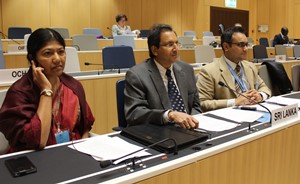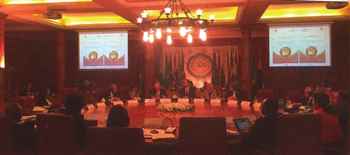
Sri Lanka has been selected as one of the four pilot countries to participate in a World Intellectual Property Organization (WIPO) Project titled “Intellectual Property, Tourism and Culture.” This Project will contribute to promoting awareness of the role of IP in Sri Lanka and supporting the tourism-related economic activities of the country. Further it will enhance the scope for utilizing IP for development in a new area, under the ongoing cooperation between WIPO and GOSL through a 10 Point Action Plan.
Dr. Francis Gurry, Director General of World Intellectual Property Organization (WIPO) communicating this decision to Ambassador Ravinatha Aryasinha, Permanent Representative of Sri Lanka to the UN in Geneva, has informed that this selection was made pursuant to Sri Lanka’s expression of interest and formal proposal submitted to WIPO to participate in this Project in August 2015. This is the first time Sri Lanka has been selected to participate as a pilot country for a Committee on Development and Intellectual Property (CDIP) Project. WIPO officials will liaise with the relevant authorities of the Government of Sri Lanka to begin project implementation early in 2016.

Addressing the plenary of the 32nd International Conference of the Red Cross & Red Crescent Societies today (9th) in Geneva, Ambassador Ravinatha Aryasinha, Permanent Representative of Sri Lanka in Geneva, has said “there is renewed political commitment and will in my country, to strengthen the national IHL compliance mechanism as well as on advancing measures to prevent and respond to all forms of violence including Sexual and Gender Based Violence (GBV), in a holistic manner”. He further noted that “this is reflective in the clear policy of the current administration to engage positively with the international community, including international organizations”.

President Maithripala Sirisena has invited the International Organization for Migration (IOM) to host a global consultation in Sri Lanka, on the lessons learnt in advancing the health of migrants.
The President extended this invitation in a special message to a panel discussion on 'migration, human mobility and global health', held during the 106th Council Session of the IOM held in Geneva on 26th November 2015, which was read by Ambassador Ravinatha Aryasinha, Sri Lanka's Permanent Representative to the UN in Geneva. The panel discussion was moderated by Ambassador William Lacy Swing, the Director General of IOM, while Dr. Margaret Chan, Director General of the World Health Organization was among the panelists.



Colombo, Sri Lanka – A two-day Senior Officials’ Meeting of the Colombo Process (CP) held in Colombo, Sri Lanka on 4-5 November 2015 has resulted in far reaching concrete decisions and recommendations aimed at advancing collective efforts for safe and skilled labour migration management by sending countries in Asia. These include the setting up of a Colombo Process Technical Support Unit (CP TSU) in Colombo, to provide support to all the CP countries in pursuing the goals and actions set in the current thematic priorities of the CP and any other areas that the CP would agree to in the future.
Hon. Ms. Thalatha Atukorale, Minister of Foreign Employment of Sri Lanka and Chair-in-Office of the Colombo Process delivering the key note address emphasized the importance of migrant workers’ contributions to economic development in both home and host countries. She reiterated Sri Lanka's commitment as CP Chair-in-Office to work towards the well being of all migrant workers of Asia, and to leverage the support of other Regional Migration Processes, as well as regional and international groups of nations and civil societies to achieve this goal.

Sri Lanka's Permanent Representative to the UN in Geneva Ravinatha Aryasinha, has said the Colombo Process (CP) countries have shown that being competitors for the same markets and competing national interests has not stood in the way of collective action, and that contrary to conventional wisdom, cooperation in the field of migration must not necessarily be a ‘zero-sum-game’.
Ambassador Aryasinha, speaking in his capacity as the Chair of the Geneva-based CP Member States at the Senior Officials Meeting of the CP which opened in Colombo on 4 November 2015, noted the effective collaboration and action-oriented role of the CP to develop concrete actions and deliverables. Sri Lanka’s chairmanship of the CP over the past two years has focused on five thematic areas: Qualification and skills recognition processes, Fostering ethical recruitment, Effective pre-departure orientation and empowerment, Reducing the costs of remittance transfer, Enhancing capacities of the Colombo Process Member States to track labour market trends. He said during Sri Lanka’s chairmanship, beyond the tangible results from the identified areas for cooperation, the CP had also strengthened its operational modalities, worked towards self funding, and also enhanced cooperation with other groups, including with the ADD, the EU through the Asia-EU Dialogue and the GFMD.

Permanent Representative of Sri Lanka to the UN in Geneva, Ambassador Ravinatha Aryasinha said that in the Sustainable Development Goals (SDGs) which are incorporated into the Development Agenda, migration cuts across several aspects of development, including improving the quality of human mobility through well managed migration policies; displacement among issues related to peaceful and inclusive societies and Disaster Risk reduction; address trafficking in a comprehensive manner and action by Finance for Development Action Agenda which deals with remittances. Ambassador Aryasinha made this observation in his opening remarks while he moderated the Session on ‘Reflecting on the outcomes of the 2013 UN high level dialogue on international migration and development with a view to implementation of the 2030 agenda for sustainable development’ of the Fifth Global Meeting of Chairs and Secretariats of Regional Consultative Processes on Migration (RCPs) held on 21st October 2015 in Cairo, Egypt.
Ambassador Aryasinha commended the significant role played by the IOM in actively contributing to the process of formulating the Post-2015 Development Agenda by advocating for migration to be recognized as an essential component of any future development framework and of national development policies and plans.
- Initiatives for migrants under Sri Lanka's leadership of the Colombo Process commended at Cairo Meeting
- Ambassador Aryasinha Addresses the 66th Session of the Executive Committee of the United Nations High Commissioner for Refugees
- Sri Lanka participates in the 55th Series of Meetings of the Assemblies of Member States of WIPO
